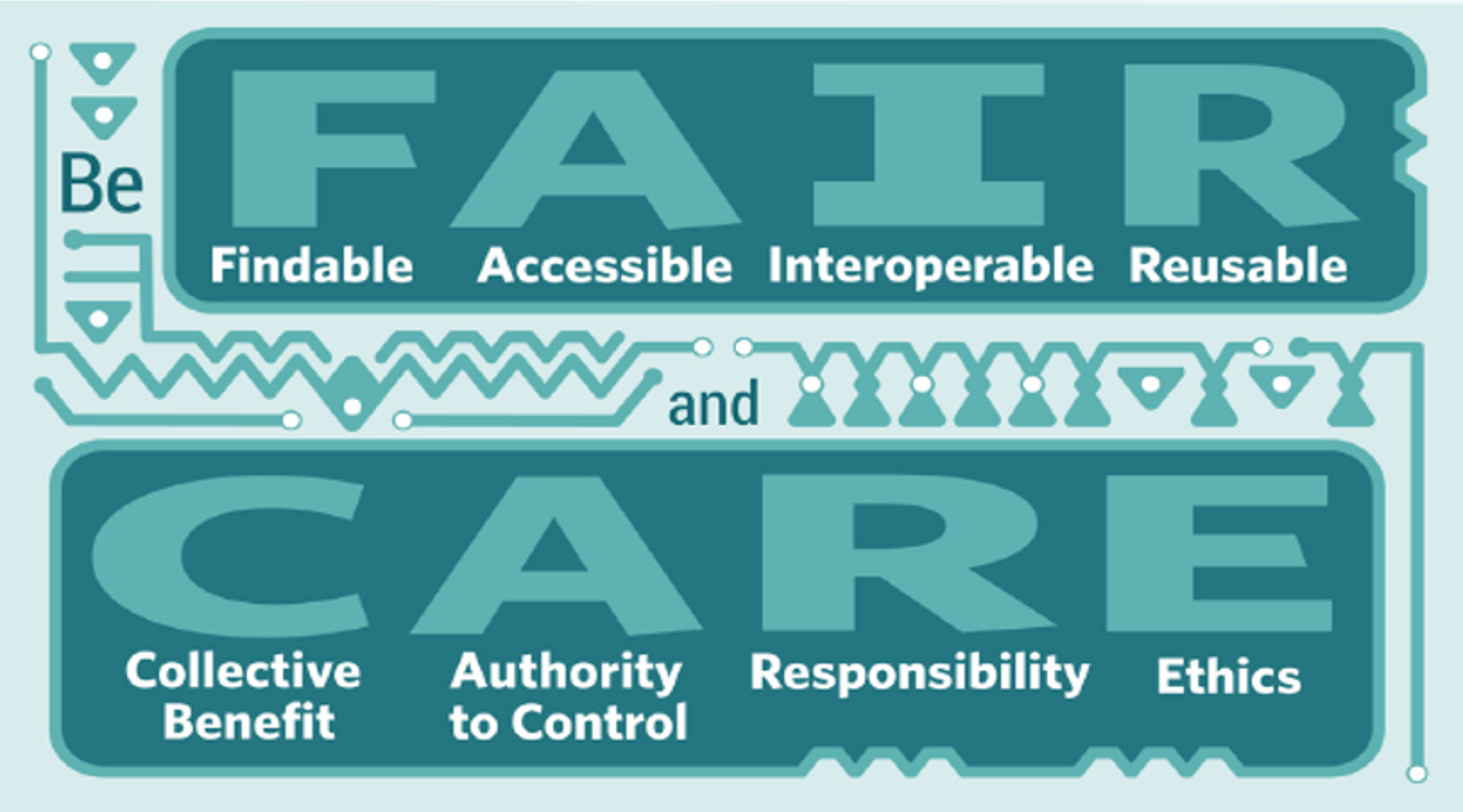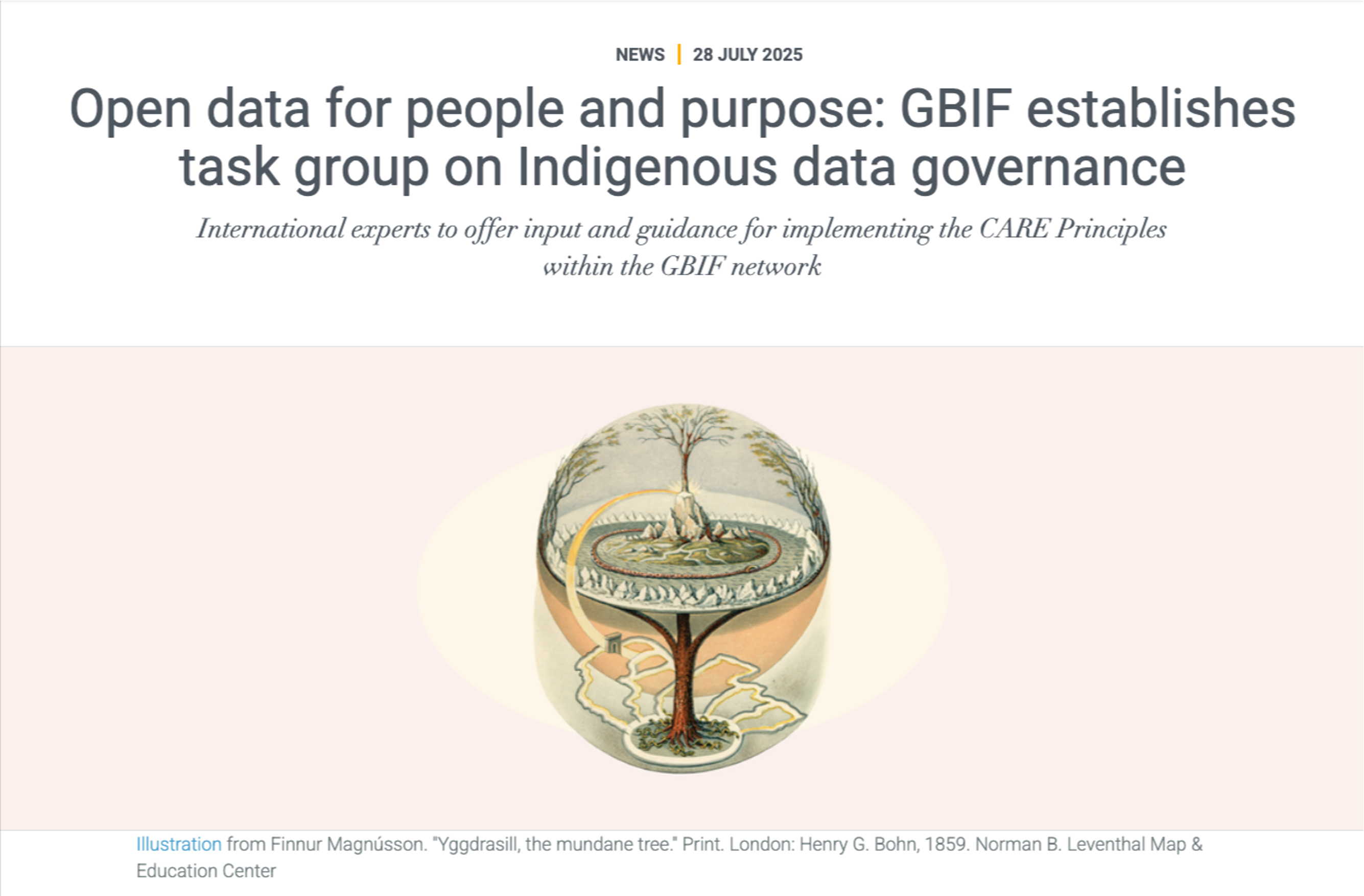Indigenous data considerations
Indigenous data sovereignty is the right of Indigenous Peoples to exercise control over Indigenous data across all phases of the data lifecycle, and recognizes Indigenous Peoples as data creators, data stewards and knowledge experts.
Indigenous data governance is the policies and practices that support Indigenous Peoples in applying Indigenous data sovereignty to govern, collect, store, analyze, use and manage the application of Indigenous data.
CARE and FAIR

The CARE data principles are an important reference for considering how these concepts can relate to open data.
Designed to complement the FAIR Principles, the CARE Principles affirm the rights of Indigenous and local peoples, nations and communities to act as self-determining custodians and users of open data. The four principles—Collective benefit, Authority to control, Responsibility and Ethics—provide a framework for aligning the actions of GBIF network members toward more equitable biodiversity data and data practices throughout the data lifecycle.
GBIF task group on Indigenous Data Governance

Recognizing the importance of seeking guidance from Indigenous peoples on how GBIF can move towards the implementation of the CARE data principles, GBIF has recently established a task group on Indigenous data governance to help guide us in this work. The task group is chaired by Dr Lydia J. Jennings, a member of the Pascua Yaqui Tribe and Assistant Professor in Environmental Science at Dartmouth College (US), and comprises eight core members from around the world.
We will soon be inviting people to join a broader GBIF Indigenous Data Governance Interest group – and we would recommend that you join this group if you are likely to have Indigenous data considerations within your proposed BID project. You can signal your interest in an "IDGov IG" email to the Secretariat’s communications team.
Resources
We have shared some external links to training and guidance materials relating to Indigenous data governance, open data and biodiversity that may be helpful references for you.
If you are aware of other guidance/training materials on these topics, please share them with training@gbif.org.
Global examples
-
The Global Indigenous Data Alliance provides materials on the CARE data principles and related research
-
Local Contexts provides information on the use of Traditional Knowledge and Biocultural Labels for Indigenous communities, institutions and researchers
-
The World Intellectual Property Organization (WIPO, 2017) has developed a toolkit for documenting traditional knowledge
-
The Open Data Institute has a Data Ethics Canvas
-
The Convention on Biological Diversity (CBD) Article 8(j) on Traditional Knowledge, Innovations and Practices. Within the CBD materials, of particular interest are:
-
The Tkarihwaié:ri Code of Ethical Conduct to Ensure Respect for the Cultural and Intellectual Heritage of Indigenous and Local Communities provides an ethical framework to guide all work in this area.
-
The Mo’otz Kuxtal Voluntary Guidelines describe the key principles of “prior and informed consent”, “free, prior and informed consent” and “approval and involvement” of Indigenous peoples and local communities for accessing their knowledge, innovations and practices, for fair and equitable sharing of benefits arising from the use of their knowledge, innovations and practices relevant for the conservation and sustainable use of biological diversity.
-
The Rutzolijirisaxik Voluntary Guidelines for the Repatriation of Traditional Knowledge which is relevant for the Conservation and Sustainable Use of Biological Diversity.
-
Local examples
-
Aotearoa New Zealand has produced Ngā Tikanga Paihere: a framework guiding ethical and culturally appropriate data use (Stats NZ, 2020),
-
Australia has worked on Our knowledge, our way, Indigenous-led approaches to strengthening and sharing our knowledge for land and sea management.
-
The First Nations Information Governance Centre has developed the principles of OCAP® to establish how First Nations’ data and information will be collected, protected, used or shared.